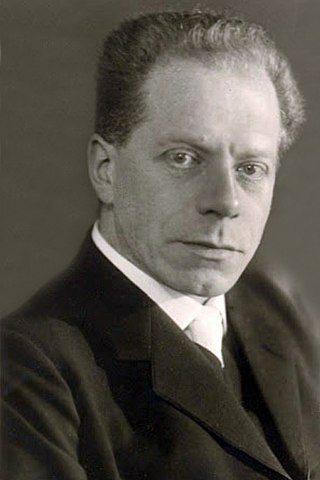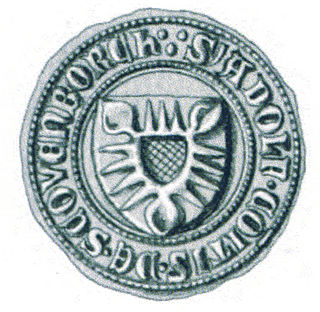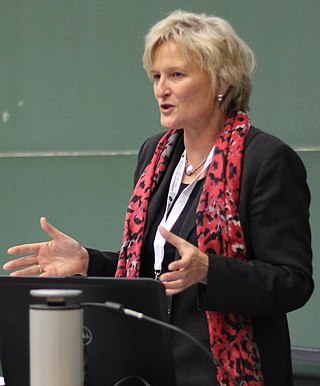Related Research Articles

Leonard Nelson, sometimes spelt Leonhard, was a German mathematician, critical philosopher, and socialist. He was part of the neo-Friesian school of neo-Kantianism and a friend of the mathematician David Hilbert. He devised the Grelling–Nelson paradox in 1908 and the related idea of autological words with Kurt Grelling.
The government of Hamburg is divided into executive, legislative and judicial branches. Hamburg is a city-state and municipality, and thus its governance deals with several details of both state and local community politics. It takes place in two ranks – a citywide and state administration, and a local rank for the boroughs. The head of the city-state's government is the First Mayor and President of the Senate. A ministry is called Behörde (office) and a state minister is a Senator in Hamburg. The legislature is the state parliament, called Hamburgische Bürgerschaft, and the judicial branch is composed of the state supreme court and other courts. The seat of the government is Hamburg Rathaus. The President of the Hamburg Parliament is the highest official person of the Free and Hanseatic City of Hamburg. This is a traditional difference to the other German states. The president is not allowed to exert any occupation of the executive.

Rotherbaum is a quarter of Eimsbüttel, a borough of Hamburg, Germany. In 2020 the population was 17,114.
Education in Hamburg covers the whole spectrum from kindergarten, primary education, secondary education, and higher education in Hamburg. The German states are primarily responsible for the educational system in Germany, and therefore the Behörde für Schule und Berufsbildung is the administrative agency in Hamburg. The Behörde für Wissenschaft und Forschung has the oversight for universities and colleges.
The forsa Institute for Social Research and Statistical Analysis, forsa for short, is one of the leading market research and opinion polling companies in Germany. It was founded in 1984 by Manfred Güllner in Cologne and is now headquartered in Berlin with a branch in Dortmund; it formerly also had an office in Riga, Latvia.

Winterhude is a quarter in the ward Hamburg-Nord of Hamburg, Germany. As of 2020 the population was 56,382.
The Internationaler Sozialistischer Kampfbund or ISK was a socialist split-off from the SPD during the Weimar Republic and was active in the German Resistance against Nazism.

Heilwig of Lippe, also known as Heilwig of Schaumburg was a German noblewoman. She was counress of Holstein by marriage to Adolf IV of Holstein.

Helmut Müller-Enbergs is a German political scientist who has written extensively on the Stasi and related aspects of the German Democratic Republic's history.
Kurt Adams was a Hamburg SPD politician and an educationalist.

Simone Lässig is the director of the German Historical Institute Washington DC and a cultural and social historian of the nineteenth and twentieth centuries.
Anke Grotlüschen is an educational researcher and professor at the University of Hamburg.
Rita Bake is a German economic and social historian. She has a degree in librarianship and is a prolific author. She was a founder in 2000/2001 of the "Garden of Women" at the vast Ohlsdorf Cemetery on the edge of Hamburg.
Alexander-Martin Sardina is a former member of parliament for the Christian Democratic Union of Germany (CDU).
Silke Leopold is a German musicologist and university lecturer.

Charlotte Paulson was a German social reformer and women's rights activist, most notably as a pioneer of education for girls.

Gabriele Hiller-Ohm is a German politician (SPD). She has been a member of the Bundestag since 2002. Since 2014, she has been the SPD parliamentary group's spokesperson for tourism policy.

Fritz Jöde was a German music educator and one of the leading figures in the Jugendmusikbewegung.

Sybille Volkholz is a German educationalist and a former Berlin senator.

Mainz Charterhouse is a former Carthusian monastery, or charterhouse, in Mainz, Rheinland-Pfalz, Germany, demolished in 1790–1792 but still marked by the street-name "Karthaus".
References
- 1 2 3 4 5 "Silke Urbanski". ... denn die Vergangenheit hat viel zu erzählen ... Literatur-Couch Medien GmbH & Co. KG. Retrieved 29 December 2018.
- ↑ "Streitbare Dozentin". Die Historikerin hat aus Protest gegen Studiengebühren ihren Lehrauftrag gekündigt. Neues Deutschland, Berlin. 18 February 2005. Retrieved 29 December 2018.
- ↑ Alexandra Topping (15 March 2011). "German universities face funding fears as states scrap fees". Tuition fees for German students are being abolished in many states, only a few years after being introduced. The Guardian, London. Retrieved 29 December 2018.
- 1 2 Material erstellt von Dr. Silke Urbanski. "Schule im Kloster Harvestehude" (PDF). Leben im Mittelalter .... Im Kloster in Harvestehude erhielten in den Jahren 1246-1530 Mädchen aus dem Adel der Gegend und die Töchter von Hamburger Kaufleuten und wohlhabenden Handwerkern ihre Ausbildung. Das Kloster funktionierte wie ein Internat. Viele der Mädchen heirateten nach der Ausbildung. Einige von ihnen blieben als Nonnen im Kloster. Freie und Hansestadt Hamburg (Behörde für Schule und Berufsbildung). Retrieved 30 December 2018.
- ↑ Silke Urbanski (1996). Geschichte des Klosters Harvestehude, "In valle virginum": wirtschaftliche, soziale und politische Entwicklung eines Nonnenklosters bei Hamburg 1245-1530. LIT Verlag Münster. ISBN 978-3-8258-2758-8.
- ↑ Gerhard Theuerkauf, Christina Deggim & Silke Urbanski (2003). Hamburg und Nordeuropa: Studien zur Stadt- und Regionalgeschichte : Festschrift für Gerhard Theuerkauf zum 70. Geburtstag (Veröffentlichungen des " Hamburger Arbeitskreises für Regionalgeschichte "). ISBN 978-3-825-87587-9.
- 1 2 "Hamburg-Geschichtsbuch". Freie und Hansestadt Hamburg (Behörde für Schule und Berufsbildung). Retrieved 30 December 2018.
- ↑ "Hamburgs Geschichte geht online". Schulbehörde und Körber-Stiftung stellen Website vor, die neue Wege in die Vergangenheit unserer Stadt öffnet. Betreibergesellschaft hamburg.de GmbH & Co. KG. 6 September 2017. Retrieved 30 December 2018.